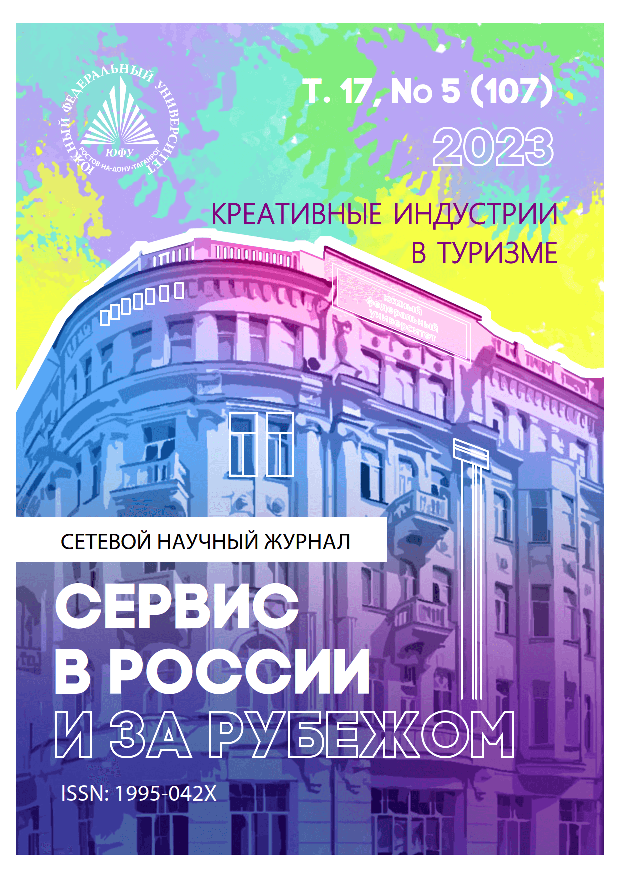Inclusive technologies in ecotourism: The case of Caucasian Biosphere Reserve
DOI:
https://doi.org/10.5281/zenodo.10428814Keywords:
inclusive technologies, ecotourism, specially protected natural areas, national parks, nature reserves, reserve cordons, inclusive tourism, accessible environmentAbstract
The article reveals the issues and development prospects for ecological tourism, one of the important directions of tourism development in natural protected areas. Ecotourism is an impetus for economic growth in the region and has great socio-cultural significance. Ecotourism has a great development potential for the Caucasian Biosphere Reserve. Ecotourism allows tourists to join nature and get a memorable opportunity to interact with unique natural objects. The experience of developing accessible infrastructure in reserves around the world shows that this area is in demand. Creating an accessible environment on the territory of the Caucasian Reserve will involve more tourists. It will attract additional investments in the development and preservation of the reserve. It will also perform cognitive, socializing and rehabilitation functions for tourists with health problems. Currently, several projects for the development of mass ecological tourism have already been implemented on the territory of the Caucasian Reserve. Equipped routes today have a length of 450 km. Thanks to the vast favorable natural territories and the efforts made, the possibility of developing inclusive tourism in the Caucasian State Biosphere Reserve is revealed. Recently, we can see the growth rates of the formation of an accessible environment in the territories of the natural protected areas of the reserve. Namely, the creation of routes accessible to all categories of tourists. The Caucasian Nature Reserve is one of the examples of the development of inclusive ecotourism on the territory of the Russian Federation.
Downloads
References
Бровко П.Ф., Фомина Н.И. История создания национального парка сеть в странах Азиатско-Тихоокеанского региона // География и природные ресурсы. 2008. №29. С. 221-225.
Дорофеев А.А., Богданова Л.П., Хохлова Е.Р. Экотуризм в России: главные дестинации и туристские прибытия // Современные проблемы сервиса и туризма. 2017. Т.11. №4. С. 38-47.
Завадская А.В. Оценка эколого-туристического потенциала природы. Памятники Камчатского края // Вестник Московского ун-та. Сер. 5. География. 2010. №3. С. 28-34.
Ивлиева О.В. Современное состояние и перспективы развития экологического туризма в Ростовской области // Сервис в России и за рубежом. 2021. Т.15. №3(95). С. 165-176.
Ивлиева О.В., Хибухина Т.Ю. Геоэкологическая оценка памятников природы Ростовской области в целях развития экологического туризма //Проблемы региональной экологии. 2017. №4. С. 70-75.
Лапочкина В.В., Косарева Н.В., Адашова Т.А. Экологический туризм в России: тенденции развития // Международный научно-исследовательский журнал. 2016. Вып.5-1(47). С. 100-105.
Джанджугазова Е.А. Развитие экологического туризма на территориях национальных парков России // Российские регионы: взгляд в будущее. 2019. №1. С. 11-18.
Chakraborty A. Does nature matter? Arguing for a biophysical turn in the ecotourism narrative // Journal of Ecotourism. 2019. Vol.18. Pp. 243-260.
Das M., Chatterjee B. Ecotourism: A panacea or a predicament? // Tourism Management Perspectives. 2015. Iss.14. Pp. 3-16.
Drumm A., Moore A., Soles A., Patterson C., Terborgh J.E. Ecotourism Development: A Manual for Conservation Planners and Managers. Vols. 1, 2. Arlington: Nature Conservancy, 2004.
Gössling S. Ecotourism: A means to safeguard biodiversity and ecosystem functions? // Ecological Economics. 1999. Iss.29. Pp. 303-320. DOI: 10.1016/s0921-8009(99)00012-9.
Orams M.B. Towards a more desirable form of ecotourism // Tourism Management. 1995. Iss.16. Pp. 3-8.
Scheyvens R. Ecotourism and the empowerment of local communities // Tourism Management. 1999. Iss.20. Pp. 245-249. DOI: 10.1016/S0261-5177(98)00069-7.
Stronza A. The Economic Promise of Ecotourism for Conservation // Journal of Ecotourism. 2007. Vol.6. Iss.3. Pp. 210-230. DOI: 10.2167/joe177.0
Surendran A., Sekhar C. A comparative analysis on the socio-economic welfare of dependents of the Anamalai Tiger Reserve (ATR) in India Margin // Journal of Applied Economic Research. 2011. Vol.5. Iss.3. Pp. 361–379.
Ruban D.A., Yashalova N.N. e-Review of Russian Ecotourism in International Studies: Limited Literature Contrasts Rich // Resources Tourism Research (eRTR). 2020. Vol.18. Iss.1. Pp. 22-48.
World Tourism Organization (2021). Accessibility and Inclusive Tourism Development in Nature Areas – Compendium of Best Practices. Madrid: UNWTO, Pp. 32-35. DOI: 10.18111/9789284422777.
Downloads
Published
How to Cite
Issue
Section
License
Copyright (c) 2023 Ivlieva, O. V., & Perepechaeva, E. A.

This work is licensed under a Creative Commons Attribution-NonCommercial-ShareAlike 4.0 International License.












